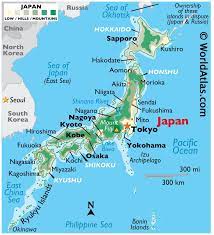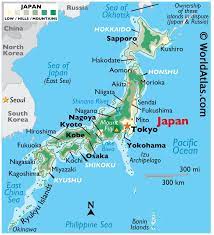Illegal to make clone
s
Although it is not a regular thing to have a clone of yourself, but is against the law to experiment with human cloning in Japan, and it has been in place since 2001. If anybody is found breaking the rule, they will be sentenced to 10 years in prison or fined heavily. This law has been put into place to deter scientists from fiddling in human cloning research.
Slurping noodles is considered polite
Slurping noodles in Japan is considered polite, as according to them, it displays appreciation for the food. So, the next time you go to a noodle restaurant in Japan, slurp and enjoy your noodles to the fullest.
What is the safest country for Women 2021?
The Netherlands was ranked the best country in the world for women, according to a new report recently published by the CEOWORLD magazine. Norway and Sweden follow up in second and third place, respectively. Denmark ranks 4th.
Eight out of the top ten countries for women are in Europe, including Finland (No. 5), Switzerland (No. 7), France (No. 9), and Germany (No. 10); the list also included Canada (No. 6) and New Zealand (No. 8).
The 2021 rankings placed Austria in 12th ahead of Italy into 13th; while Luxembourg ranked 11th and Spain 14th. Overall, among the top 20 best countries in the world, for women to live, the 15th, 16th, and 17th positions are held by Japan, Australia, and the United Kingdom.
“There is a universal pattern of discrimination and crime against women, but volume and intensity differ from nation to nation. Regional, racial, and socio-economic factors play a crucial role in determining the objectification of the feminine body and gender equality,” said Prof. Dr. Amarendra Bhushan Dhiraj, Chief Executive at CEOWORLD magazine. “Frankly, there is no nation in the world that is 100% safe for women with the freedom to live equally. But, some countries are better than others when it comes to equal rights, social inclusion, and a sense of security.”
Based on a survey of nearly 390,500 women around the world, CEOWORLD magazine has released its annual ranking of the Best Countries for Women. To produce the Best Countries for Women list, 156 countries were given scores across 9 attributes: gender equality, percentage of legislative seats held by women, sense of security (females 15 years and older who report feeling safe while walking alone at night), income equality, care about human rights, women empowerment, average years of education among women, women age 25 and older who are engaged in paid work, and women’s inclusion in society.
The World’s Best Countries For Women, 2021
| Rank | Country | Score |
|---|---|---|
| 1 | Netherlands | 99.7 |
| 2 | Norway | 99.4 |
| 3 | Sweden | 99.2 |
| 4 | Denmark | 98.7 |
| 5 | Finland | 98.3 |
| 6 | Canada | 97.5 |
| 7 | Switzerland | 97.1 |
| 8 | New Zealand | 96.8 |
| 9 | France | 96.4 |
| 10 | Germany | 95.9 |
| 11 | Luxembourg | 95.7 |
| 12 | Austria | 95.2 |
| 13 | Italy | 94.8 |
| 14 | Spain | 94.4 |
| 15 | Japan | 93.69 |
| 16 | Australia | 92.08 |
| 17 | United Kingdom | 91.26 |
| 18 | Portugal | 91.23 |
| 19 | Singapore | 90.68 |
| 20 | United States | 90.3 |
| 21 | Ireland | 89.67 |
| 22 | Belgium | 89.11 |
| 23 | Iceland | 88.73 |
| 24 | Poland | 88.52 |
| 25 | Monaco | 88.23 |
| 26 | San Marino | 87.76 |
| 27 | Liechtenstein | 87.64 |
| 28 | Greece | 87.62 |
| 29 | Israel | 86.85 |
| 30 | Andorra | 86.6 |
| 31 | Malta | 86.38 |
| 32 | Czech Republic | 86.02 |
| 33 | Hungary | 85.08 |
| 34 | Cyprus | 84.96 |
| 35 | Russia | 84.75 |
| 36 | Serbia | 84.64 |
| 37 | Lithuania | 84.43 |
| 38 | Mexico | 83.79 |
| 39 | Latvia | 83.39 |
| 40 | Croatia | 83.39 |
| 41 | Moldova | 83.26 |
| 42 | Bulgaria | 83.04 |
| 43 | Armenia | 82.95 |
| 44 | Albania | 82.87 |
| 45 | Kosovo | 82.8 |
| 46 | Montenegro | 82.69 |
| 47 | North Macedonia | 82.48 |
| 48 | Slovenia | 82.38 |
| 49 | India | 82.34 |
| 50 | Azerbaijan | 82.24 |
| 51 | Saint Kitts and Nevis | 82.06 |
| 52 | Georgia | 81.93 |
| 53 | Grenada | 81.82 |
| 54 | Taiwan | 81.46 |
| 55 | Bhutan | 81.08 |
| 56 | South Korea | 80.96 |
| 57 | Philippines | 80.83 |
| 58 | Thailand | 80.78 |
| 59 | Brazil | 80.68 |
| 60 | Turkey | 80.11 |
| 61 | Cuba | 79.69 |
| 62 | Saint Vincent and the Grenadines | 79.54 |
| 63 | Romania | 79.46 |
| 64 | Guatemala | 79.39 |
| 65 | Argentina | 79.08 |
| 66 | Ukraine | 78.86 |
| 67 | Peru | 78.86 |
| 68 | Barbados | 78.77 |
| 69 | Colombia | 78.72 |
| 70 | Bosnia and Herzegovina | 78.49 |
| 71 | Bolivia | 77.95 |
| 72 | Antigua and Barbuda | 77.94 |
| 73 | Costa Rica | 77.75 |
| 74 | Bahamas | 77.55 |
| 75 | Kazakhstan | 77.42 |
| 76 | Jamaica | 77.35 |
| 77 | Belarus | 77.28 |
| 78 | Trinidad and Tobago | 77.22 |
| 79 | Chile | 77.16 |
| 80 | Paraguay | 76.77 |
| 81 | Venezuela | 76.77 |
| 82 | Myanmar | 76.76 |
| 83 | Ecuador | 76.56 |
| 84 | Mongolia | 76.46 |
| 85 | Guyana | 76.46 |
| 86 | Maldives | 76.32 |
| 87 | Indonesia | 75.66 |
| 88 | Vietnam | 75.52 |
| 89 | Saudi Arabia | 75.49 |
| 90 | Malaysia | 75.45 |
| 91 | Oman | 75.11 |
| 92 | Sri Lanka | 74.89 |
| 93 | Laos | 74.8 |
| 94 | Cambodia | 74.79 |
| 95 | China | 74.13 |
| 96 | Jordan | 74.11 |
| 97 | Kyrgyzstan | 73.66 |
| 98 | Tajikistan | 73.59 |
| 99 | Nepal | 73.21 |
| 100 | United Arab Emirates | 73.16 |
| 101 | Uruguay | 73.08 |
| 102 | North Korea | 73.05 |
| 103 | Suriname | 72.95 |
| 104 | Algeria | 72.74 |
| 105 | Sudan | 72.57 |
| 106 | Turkmenistan | 72.33 |
| 107 | Qatar | 72.03 |
| 108 | Uzbekistan | 72.03 |
| 109 | Mozambique | 72.02 |
| 110 | Cameroon | 71.38 |
| 111 | Kuwait | 71.15 |
| 112 | South Africa | 71.01 |
| 113 | Mauritius | 70.64 |
| 114 | Namibia | 70.61 |
| 115 | Seychelles | 70.55 |
| 116 | Lebanon | 70.36 |
| 117 | Libya | 70.31 |
| 118 | Kenya | 70.14 |
| 119 | Zimbabwe | 69.43 |
| 120 | DR Congo | 69.18 |
| 121 | Zambia | 68.99 |
| 122 | Madagascar | 68.96 |
| 123 | Iraq | 68.73 |
| 124 | Egypt | 68.58 |
| 125 | Tunisia | 68.5 |
| 126 | Brunei | 68.09 |
| 127 | Tanzania | 68.06 |
| 128 | Bahrain | 67.65 |
| 129 | Liberia | 65.01 |
| 130 | Nigeria | 64.71 |
| 131 | Ghana | 64.42 |
| 132 | Sierra Leone | 63.84 |
| 133 | Benin | 62.25 |
| 134 | Iran | 61.62 |
| 135 | Eritrea | 60.96 |
| 136 | Malawi | 59.95 |
| 137 | Togo | 58.23 |
| 138 | Gabon | 57.18 |
| 139 | Burkina Faso | 56.8 |
| 140 | South Sudan | 53.41 |
| 141 | Timor-Leste | 52.4 |
| 142 | Senegal | 51.26 |
| 143 | Mauritania | 49.43 |
| 144 | Uganda | 46.91 |
| 145 | Pakistan | 44.81 |
| 146 | Ethiopia | 44.73 |
| 147 | Yemen | 43.95 |
| 148 | Angola | 42.25 |
| 149 | Afghanistan | 41.6 |
| 150 | Guinea-Bissau | 40.95 |
| 151 | Lesotho | 38.56 |
| 152 | Niger | 23.56 |
| 153 | Syria | 21.98 |
| 154 | Chad | 19.3 |
| 155 | Somalia | 14.68 |
| 156 | Central African Republic | 12.93 |
Each country was given an equally-weighted score across 9 attributes in order to produce the women-focused ranking. Unsurprisingly, Scandinavian countries dominated the list. The latest data show that some of the worst countries for women have achieved gains, even as some of the best are lagging in crucial areas. In order to determine the rankings, researchers at the CEOWORLD magazine compiled analyzed and compared 150 nations across 9 key attributes: gender equality, percentage of legislative seats held by women, sense of security (females 15 years and older who report feeling safe while walking alone at night), income equality, care about human rights, women empowerment, average years of education among women, women age 25 and older who are engaged in paid work, and women’s inclusion in society. These attributes are combined into a common measure which gives an overall ranking.
Each individual indicator was given equal weighting within each of the 9 categories. To secure a place on this year’s list, countries had to rank among the top 150 nations in the world in the U.N. Human Development Index as well as among the top 100 countries in terms of GDP, foreign direct investment inflows, and international tourism receipts, according to the World Bank data. Nations that did not meet these four criteria or that didn’t report this data were excluded.




0 Comments:
Post a Comment
Please ,
Do not enter any kind of span link